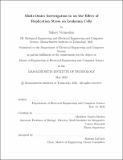| dc.contributor.advisor | Heiden, Matthew Vander | |
| dc.contributor.author | Vermeulen, Sidney | |
| dc.date.accessioned | 2022-08-29T16:04:27Z | |
| dc.date.available | 2022-08-29T16:04:27Z | |
| dc.date.issued | 2022-05 | |
| dc.date.submitted | 2022-05-27T16:18:28.297Z | |
| dc.identifier.uri | https://hdl.handle.net/1721.1/144682 | |
| dc.description.abstract | Differentiation therapy has the potential to treat cancers like acute myeloid leukemia. While the DHODH inhibitor has been shown to induce differentiation in an AML model, the mechanism that this happens is still unknown. Here we characterize a similar differentiation phenotype in the CML cell line K562. Like AML lines studied previously, replication stress leads cells to adopt a cell state similar to oncogene knockdown. Replication stress is likely not acting through chromatin state directly given that upregulated genes did not vary in their H3K27 modification or polymerase pausing, and many chromatin modifier genes that suppressed THP1 differentiation did not also suppress differentiation in K562s. Thus, the mechanism of how replication stress leads to differentiation is still unknown. | |
| dc.publisher | Massachusetts Institute of Technology | |
| dc.rights | In Copyright - Educational Use Permitted | |
| dc.rights | Copyright MIT | |
| dc.rights.uri | http://rightsstatements.org/page/InC-EDU/1.0/ | |
| dc.title | Multi-Omics Investigation to on the Effect of Replication Stress on Leukemia Cells | |
| dc.type | Thesis | |
| dc.description.degree | M.Eng. | |
| dc.contributor.department | Massachusetts Institute of Technology. Department of Electrical Engineering and Computer Science | |
| mit.thesis.degree | Master | |
| thesis.degree.name | Master of Engineering in Electrical Engineering and Computer Science | |
